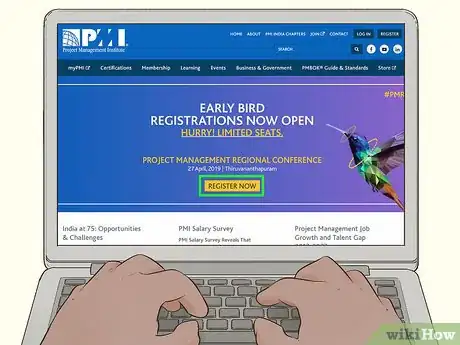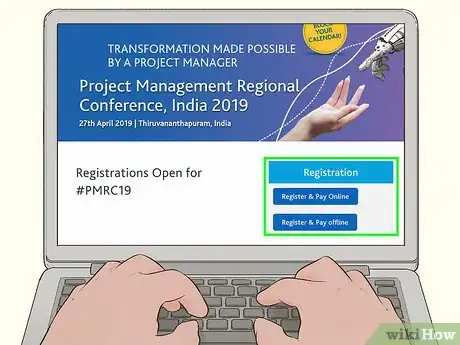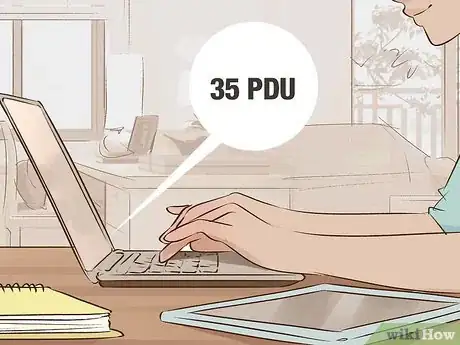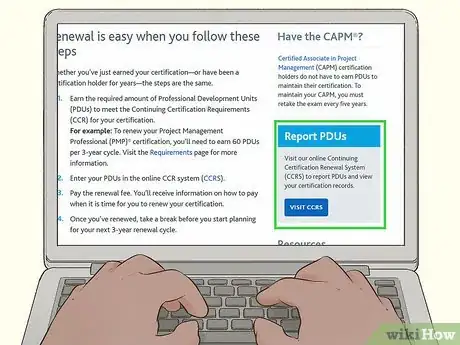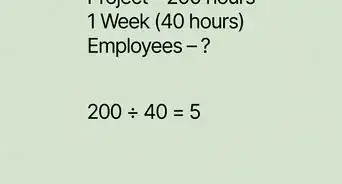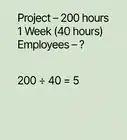This article was co-authored by wikiHow Staff. Our trained team of editors and researchers validate articles for accuracy and comprehensiveness. wikiHow's Content Management Team carefully monitors the work from our editorial staff to ensure that each article is backed by trusted research and meets our high quality standards.
There are 9 references cited in this article, which can be found at the bottom of the page.
wikiHow marks an article as reader-approved once it receives enough positive feedback. This article received 11 testimonials and 91% of readers who voted found it helpful, earning it our reader-approved status.
This article has been viewed 253,170 times.
Learn more...
Project managers can be found in practically every industry across the world, leading and directing projects and teams. Becoming a certified Project Management Professional (PMP) through the Project Management Institute (PMI) can take your career to the next level. Although it is not required to hold most management positions, earning your certification will allow you to accept more responsibility at higher levels within your company—and often results in a salary boost, as well.
Steps
Meeting the Prerequisites
-
1Work in professional project management for 5 years if you don’t have a bachelor’s degree. Before you can apply to become a PMP, you must complete the educational and professional experience requirements. If you have a secondary degree—a high school diploma, an associate’s degree, or the global equivalent—and not a 4-year degree, you must have worked in professional project management for at least 5 years (60 months). During that period, you must have spent a minimum of 7,500 hours leading and directing projects.[1]
- Although your hours are self-reported on the PMP application, you may be subject to a randomly-assigned audit after submission. If so, you will have to provide signatures from your manager or supervisor for each project you included in the experience section of your application.[2]
-
2Get 3 years of experience in professional project management if you have a bachelor’s degree. If you have a 4-year degree—either a bachelor’s degree or a global equivalent—you must have worked in professional project management for at least 3 years (36 months) before applying to become a PMP. During that time, you must have spent a minimum of 4,500 hours leading and directing projects.[3]
- Any bachelor's degree will satisfy the education requirement. It does not have to be business or project management-related.
- Your hours are self-reported on the PMP application, but you may be subject to a randomly-assigned audit after submission. If so, you will have to provide signatures from your manager or supervisor for each project you included in the experience section of your application.[4]
Advertisement -
3Complete a 35-hour project management training. All candidates must pass a project management course offered by a Project Management Institute (PMI)-recognized provider, regardless of education level. Valid PMP prep courses are offered almost everywhere in the world. As of 2018, costs range from $2,00-2,500 for an instructor-led classroom course (some of which are affiliated with universities, but not all) to $200-500 for a quality podcast course.[5]
- Check the PMI website at https://www.pmi.org/ to locate the most convenient registered education provider for you.
Passing the PMP Exam
-
1Register online to become a member of the Project Management Institute (PMI). Although it is not mandatory to become a PMI member, it is highly recommended. You will save money on exam fees—$405 for members or $555 for non-members, as of March 2019. You also get access to a digital copy of A Guide to the Project Management Body Of Knowledge (PMBOK Guide), the book on which the entire exam is based. Visit the PMI website to join.
- As of March 2019, a standard PMI membership costs $129 per year, plus a $10 application fee. Student memberships are discounted to $32. To qualify, you must be a full-time student enrolled in a degree-granting program at a U.S.-accredited university or college (or the global equivalent).[6]
- You can also join a local chapter in addition to the international organization. This costs roughly an additional $30 as of March 2019, but will offer additional networking and job hunting opportunities.[7]
-
2Apply and pay for the PMP exam online. Create an account on PMI's website at https://www.pmi.org/certifications/process, and fill out an online form that lays out your experience and education. Once you’ve submitted your application, you should receive an eligibility email in 3 to 5 business days. You can then pay your exam fee, which is $405 for PMI members and $555 for non-members as of March 2019.[8]
- A select number of applicants are randomly selected for physical audit by PMI. If you are chosen for audit, you will need to submit hard copies of your credentials (education, work experience and training). An audit may take up to 6 weeks to get approval, after which you can schedule your exam.
-
3Schedule your exam through the Prometric website. After your application has been approved, you have 1 year to take the exam. PMI does not administer the test themselves. Instead, they use an international testing company called Thomson Prometric. Locate the nearest testing center and schedule your test date through Prometric’s website at https://www.prometric.com.[9]
- A good rule of thumb is to schedule your test 3 months out, which gives you ample time to prepare but isn’t so long that you’ll lose motivation.[10]
-
4Study independently or attend a PMP prep class. Decide which option makes sense for you based on how much time and money you have to spare. As of March 2019, the average class ranges in price from $1,700 to $4,200, depending on the provider. Independent study guides and sample exams tend to cost around $200-300. The average study time is 2 to 3 months for independent study, compared to 3 to 5 days when enrolled in a class. Regardless of your option, you will need to master the entire PMBOK Guide.[11]
- Passing rates are higher for those who enroll in classes.[12]
-
5Pass the exam and earn your certification. Unlike the rest of the process, you must take the PMP exam in person. It is a 4-hour test consisting of 200 questions. Your pass/fail results are presented to you immediately after the test is finished, while your certification will be mailed about a month later.[13]
- If you don’t pass the exam on your first try, there is a 1-year eligibility period to retake the test and pass. During that time, you can take the exam 2 more times. If you fail 3 times, you must wait 1 year from the date of the last exam to apply for certification again.[14]
Maintaining Your Certification
-
1Earn a minimum of 35 Professional Development Units (PDUs) through education. As a certified PMP, you must regularly renew your certification by participating in PMI’s Continuing Certification Requirements (CCR) program. The CCR program requires you to earn a total of 60 PDUs every 3 years. Typically, 1 PDU is equivalent to 1 hour of project management training.[15] At least 35 of these PDUs must be centered around continuing education. This requirement is further broken down into 3 categories:[16]
- A minimum of 8 PDUs must focus on technical project management skills
- A minimum of 8 PDUs must focus on leadership skills.
- A minimum of 8 PDUs must focus on strategic and business management.
- The additional 11 PDUs can relate to any of the three categories.
-
2Complete a maximum of 25 PDUs by giving back to the profession. This includes activities such as teaching project management courses, volunteering, or working as a professional—anything that allows you to use and share your skills and knowledge to build up and contribute to the profession.[17]
- You can earn a maximum of 25 PDUs from giving back, but there is no minimum. That means this is an optional way to earn PDUs. You could, if you like, earn all your PDUs through continuing education.
- Working as a professional only counts towards a maximum of 8 PDUs.
-
3Report PDUs through the PMI website to renew certification. Once you’ve completed your 60 PDUs, make sure that you record these hours through your personal dashboard on the PMI website. This is where you can monitor your existing PDUs and claim new ones.[18]
- There is no cost to maintain your membership, other than the costs associated with acquiring PDUs.
- The PDUs are self-reported—although you are asked to provide information about the provider who offered the training or course and the dates you attended, you do not need to provide further evidence of your participation.[19]
Community Q&A
Did you know you can get answers researched by wikiHow Staff?
Unlock staff-researched answers by supporting wikiHow
-
QuestionIs the PMP exam difficult?
 wikiHow Staff EditorThis answer was written by one of our trained team of researchers who validated it for accuracy and comprehensiveness.
wikiHow Staff EditorThis answer was written by one of our trained team of researchers who validated it for accuracy and comprehensiveness.
Staff Answer wikiHow Staff EditorStaff AnswerThe PMP exam does have a reputation for being difficult. It’s designed to test your problem-solving ability using both your own logic and your knowledge and understanding of the material. The questions are intentionally designed to be tricky, so it’s important to read them very carefully and make sure you understand them.
wikiHow Staff EditorStaff AnswerThe PMP exam does have a reputation for being difficult. It’s designed to test your problem-solving ability using both your own logic and your knowledge and understanding of the material. The questions are intentionally designed to be tricky, so it’s important to read them very carefully and make sure you understand them. -
QuestionWhich project management certification is best?
 wikiHow Staff EditorThis answer was written by one of our trained team of researchers who validated it for accuracy and comprehensiveness.
wikiHow Staff EditorThis answer was written by one of our trained team of researchers who validated it for accuracy and comprehensiveness.
Staff Answer wikiHow Staff EditorStaff AnswerIt depends on your needs. The PMP is great if you already have lots of management experience, while the CAPM (Certified Associate in Project Management) is a great option for people just starting out in the field. The CSM (Certified ScrumMaster) certification from Scrum Alliance and the CSSBB (Certified Six Sigma Black Belt) certification from ASQ are also sought after by many employers.
wikiHow Staff EditorStaff AnswerIt depends on your needs. The PMP is great if you already have lots of management experience, while the CAPM (Certified Associate in Project Management) is a great option for people just starting out in the field. The CSM (Certified ScrumMaster) certification from Scrum Alliance and the CSSBB (Certified Six Sigma Black Belt) certification from ASQ are also sought after by many employers. -
QuestionWhat’s the typical salary for someone with a PMP certificate?
 wikiHow Staff EditorThis answer was written by one of our trained team of researchers who validated it for accuracy and comprehensiveness.
wikiHow Staff EditorThis answer was written by one of our trained team of researchers who validated it for accuracy and comprehensiveness.
Staff Answer wikiHow Staff EditorStaff Answer
wikiHow Staff EditorStaff Answer
References
- ↑ https://www.pmi.org/-/media/pmi/documents/public/pdf/certifications/project-management-professional-handbook.pdf?la=en
- ↑ https://www.pmi.org/-/media/pmi/documents/public/pdf/certifications/project-management-professional-handbook.pdf?la=en
- ↑ https://www.pmi.org/-/media/pmi/documents/public/pdf/certifications/project-management-professional-handbook.pdf?la=en
- ↑ https://www.pmi.org/-/media/pmi/documents/public/pdf/certifications/project-management-professional-handbook.pdf?la=en
- ↑ https://www.pmbypm.com/pmp-certification-cost/#.XHANZs9KgWp
- ↑ https://www.pmi.org/membership/join
- ↑ https://www.ais-cpa.com/how-to-become-a-pmp-project-management-professional/
- ↑ https://www.ais-cpa.com/how-to-become-a-pmp-project-management-professional/
- ↑ https://www.project-management-prepcast.com/free/pmp-exam/articles/29-10-steps-to-becoming-a-pmp
- ↑ https://www.thebalancecareers.com/how-to-become-a-certified-project-manager-1669733
- ↑ https://www.thebalancecareers.com/how-to-become-a-certified-project-manager-1669733
- ↑ https://www.thebalancecareers.com/how-to-become-a-certified-project-manager-1669733
- ↑ https://www.thebalancecareers.com/how-to-become-a-certified-project-manager-1669733
- ↑ https://www.pmi.org/-/media/pmi/documents/public/pdf/certifications/project-management-professional-handbook.pdf?la=en
- ↑ http://entangled.com/what-are-pdus/
- ↑ http://www.pmi.org/-/media/pmi/documents/public/pdf/certifications/ccr-certification-requirements-handbook.pdf
- ↑ http://www.pmi.org/-/media/pmi/documents/public/pdf/certifications/ccr-certification-requirements-handbook.pdf
- ↑ https://www.ais-cpa.com/how-to-become-a-pmp-project-management-professional/
- ↑ http://pdu.pmi.org/pdf/tipsforPDUs.pdf
About This Article
To become a certified project management professional, you'll need to work in the project management field for 5 years if you don’t have a bachelor’s degree or 3 years if you have your college diploma. You'll also need to pass a project management course offered by a Project Management Institute-recognized provider. Another requirement for becoming a certified project manager is taking and passing your PMP exam. If you don't pass the exam the first time, you can retake it two more times during the same calendar year. To learn how to maintain your certification, keep reading!



